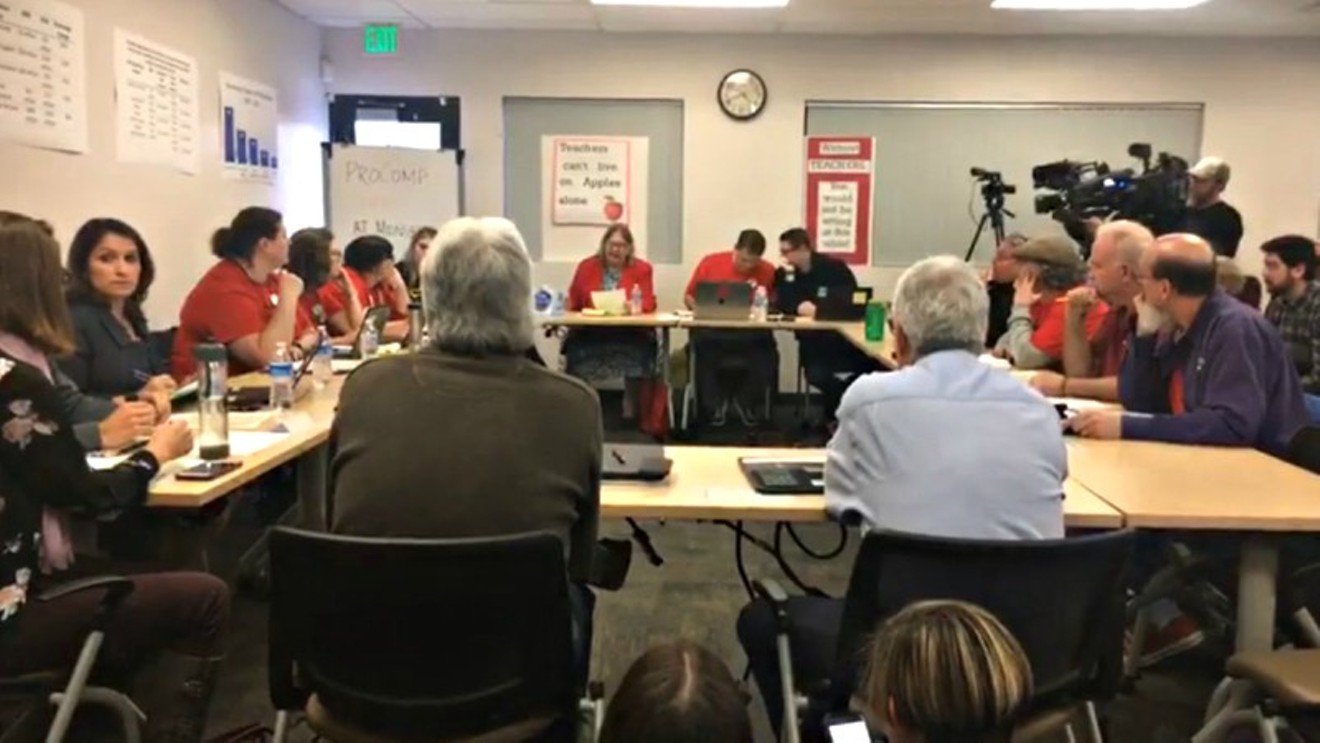But even as Alan Salazar, Hancock's chief of staff, touts the office's efforts to date, most of them conducted behind the scenes, he acknowledges that there are definite limits to what his boss can do.
"The mayor does not have the legal authority to intervene," he says. "That rests with the governor and the state" — and Governor Jared Polis announced earlier this week that he wouldn't block a work stoppage. "What the mayor does have, though, are the resources of his office, his own experience with the issue and the bully pulpit. And he's used all three of those tools to establish trust and encourage a resolution."
He adds: "Supporting the strike or joining the picket line is an easy political way to show support for teachers. But just like Mayor [Eric] Garcetti did in L.A.," where a six-day teachers strike ended on January 22, "the mayor has a responsibility to be able to work with both sides, respecting the governor’s role and also building trust for what we hope will be a good outcome."

Denver Mayor Michael Hancock wants to establish trust with the union and the district.
Anthony Camera
To that end, Salazar notes, "the mayor quietly met with both sides separately [on January 26] to educate himself on what was dividing the union from DPS. The mayor's attitude has been that Denver teachers deserve a pay raise, and his hope has been that the district and the union would come to some agreement. The mayor has reiterated his desire to resolve the issue, and we've offered up resources from the city that might help bridge the divide."
Those include the Denver Office of Children's Affairs "when it comes to analyzing incentive pay," Salazar goes on, as well as "the Department of Finance when it comes to crunching numbers and looking at a common set of numbers, and the Peak Performance program, which has had some success in finding efficiencies in city government. We think DPS might benefit from a similar approach and maybe find more dollars to put on the table to meet the teachers' needs."
These suggestions were reiterated in letters Hancock sent to DCTA president Henry Roman and DPS superintendent Susana Cordova in the days following the meeting. They're accessible below.
Afterward, Salazar goes on, "we stayed in touch with the union and the district at the staff level, and the mayor also stayed in touch with the governor. They talked. And we've also met with the Colorado Education Association to get their perspective."
In Salazar's view, such efforts aren't necessarily "about preventing a strike, but about resolving the underlying issues. The teachers may feel they need to send a very strong message back to the district about their needs. A prolonged strike would, I think, be very challenging for the city, and we're very concerned about that. But the mayor would like to help reach a common goal, which is to pay Denver teachers better."
Salazar points out that Hancock has endorsed assorted education-related ballot initiatives during his time in office and has consistently advocated for better teacher pay. But Hancock spokeswoman Theresa Marchetta offers another reason for his efforts: "You have to remember, this is the mayor's town. He went to these schools. He's a dad, and his kids grew up here. There's a personal connection and a caring the city staff has to insure there's a positive resolution. We care about teachers and kids impacted by this."
Moreover, Salazar says, "it does not seem to us that the issues separating the union and the district are so insurmountable that we can't get this resolved. If it's about numbers, there's a way to get to the numbers. If it's about incentive pay, there's a way to get to an agreement on it. That's the attitude of the administration."
At the end of the day, Salazar adds, "the mayor can play a positive role, but only if both sides want that. We can't impose ourselves. We can only offer in good faith to work with both sides."
The latest round of negotiations between the Denver Classroom Teachers Association and Denver Public Schools gets under way at 5 p.m. tonight, February 8, at 1617 South Acoma Street. Click for more details and to read Mayor Hancock's letters to DCTA president Roman and Superintendent Cordova.













